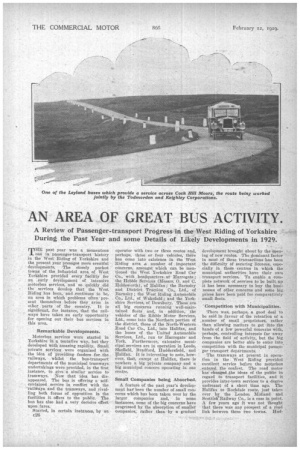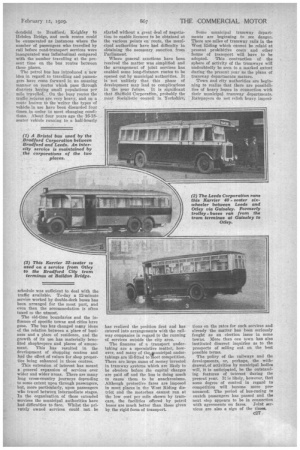AN AREA OF GREAT BUS ACTIVITY.
Page 10

Page 11

If you've noticed an error in this article please click here to report it so we can fix it.
A Review of Passenger-transport Progress in the West Riding of Yorkshire During the Past Year and some Details of Likely Developments in 1929.
THE past year was a momentous one in passenger-transport history in the West Riding of Yorkshire and the present year presages more eventful developments. The closely packed towns of the industrial area of West Yorkshire provided every facility for an early development of intensive motorbus services, and so quickly did the services develop that the West Riding has been, and continues to be, an area in which problems oftenpresent themselves before they arise in other parts of the country: . It is significant, for instance, that the railways have taken an early opportunity for opening out their bus services in this area.
Remarkable Developments.
Motorbus services were started in Yorkshire in a tentative way, but they developed with amazing rapidity. Small private services were organized with the idea of providing feeders for the. railways, whilst the bus-transport departments of the municipal tramways undertakings were provided, in the first instance, to give a similar service to tramways. Now that idea has disappeared. The bus is offering a selfcontained service in conflict with the railways and the tramways, and rivalling both forms of opposition in the facilities it offers to the public. The bus has also had a very decisive effect upon fares.
Started, in certain instances, by an e2G operator with two or three routes and, perhaps, three or four vehicles, there has come into existence in the West Riding area a number of important concerns, amongst which can be mentioned the West Yorkshire Road Car Co., with headquarters • at Harrogate ; the Hebble Services (Messrs. 0. and C. HoldsWorth), of Halifax; the Barnsley and District Traction Co.,. Ltd., of Barnsley; the .West Riding Automobile CO., Ltd., of Wakefield; and the Yorkshire Services, of Dewsbury. These are all big concerns running well-maintained fleets . and, in addition, the vehicles of the Ribble Motor Services, Ltd., come into the Northern portion of the district, those of the North-Western Road Car Co., Ltd., into Halifax, and the buses of the United Automobile Services, Ltd., run to Harrogate' and York. Furthermore, extensive municipal services are in operation in Leeds, Sheffield, Bradford, Huddersfield, and ffalifax. It is interesting to note, however, that, except at Halifax, there is nowhere a big private company and a big municipal concern operating in one centre.
Small Companies being Absorbed.
A feature of the past year's development has been the number of small concerns which has been taken over by the larger companies and, in some instances, some of the big concerns have progressed by the absorption of smaller companies, rather than by a gradual
development brought about by the opening of new routes. The dominant factor in most of these transactions has been the difficulty of securing licences, especially in those centres in which the municipal authorities have their own transport services. To enable a complete network of services to be built up it has been necessary to buy the businesses of other concerns and some big prices have been paid for comparatively small fleets.
Competition with Municipalities.
There was, perhaps, a good deal to be said in favour of the retention of a ,number of small proprietora, rather than allowing matters to get into the hands of a few powerful concerns with, perhaps, controlling interests far away from the field of activity, but the big companies are better able to enter into competition with the municipal passenger transport departments.
The tramways at present in operation in the West Riding provided excellent service before the motorbus entered the coniest. The road motor has changed .the ideas of the public in regard to transport facilities, and it provides inter-town services to a degree undreamt Of a short time ago. The Halifax to Rochdale route, lust taken over bT the Loudon Midland and Scottish Railway Co., is a case in point. A few years ago it was not thought that there was any prospect of a rbad link between these two towns. Had dersfield to Bradford, Keighley lIebden Bridge, and such routes could be enumerated as instances where the number of passengers who travelled by rail before road-transport services were inaugurated was infinitesimal compared with the number travelling at the present time on the bus routes between these places.
The petrol bus has introduced a new idea in regard to travelling and passengers have come forward in an amazing manner on routes which pass through districts having small populations per mile travelled.. On the busy routes the traffic returns are very heavy, and on a route known td the 'writer the types of vehicle in use have been discarded four times in •order to meet. changing conditions. About four years ago the 1648seater vehicle running to a half-hourly sfarted without a great deal of negotiation to enable licences to be obtained at the various points en route, the municipal authorities have had difficulty in obtaining the necessary. sanction from. Parliament.
Where general sanctions have been received the matter was simplified and the arrangement of joint services has enabled some long-distance routes to be opened out by municipal authorities. It is not unlikely that this phase of development may lead to complications in the near future. It is significant that Sheffield "Corporation, probably the most Socialistic council in Yorkshire, Some municipal tramway departments are beginning to see danger. There are miles of tramway rails in the West Riding which cannot be relaid at present prohibitive costs and other forms of transport will have to be adopted. This contraction of the sphere of activity of the tramways will undoubtedly be seen to a marked extent during the present year as the plans of tramway departments mature.
Town and city authorities are beginning to realize that there are possibilities of heavy losses in connection with their municipal tramway departments. Ratepayers do not relish heavy imposi•






























